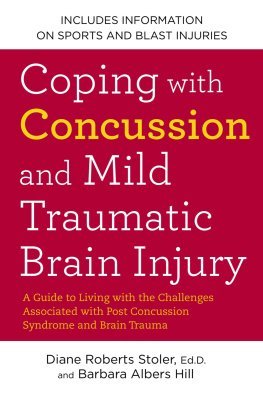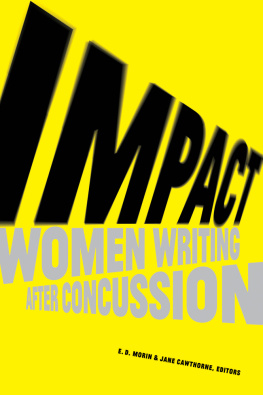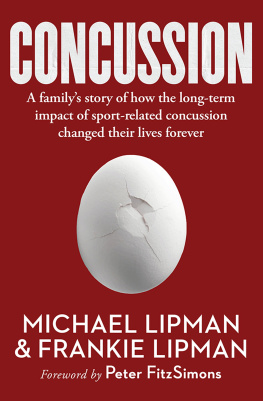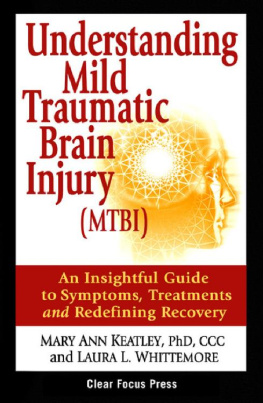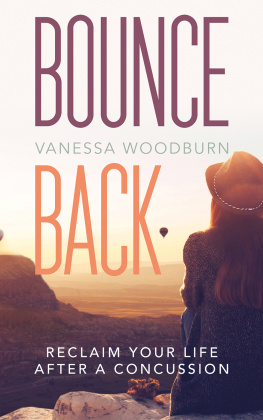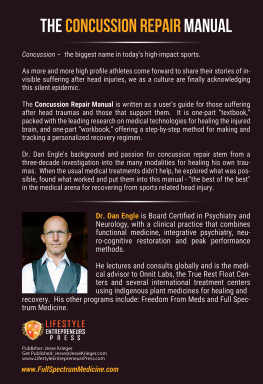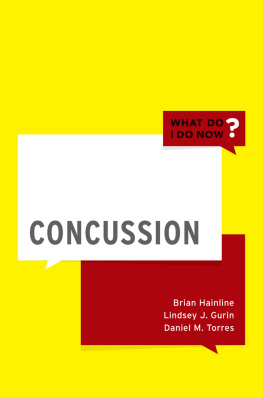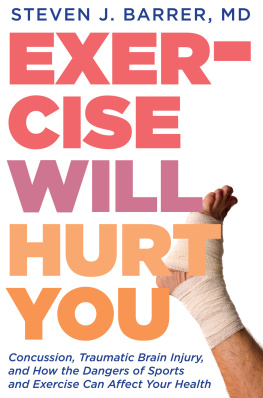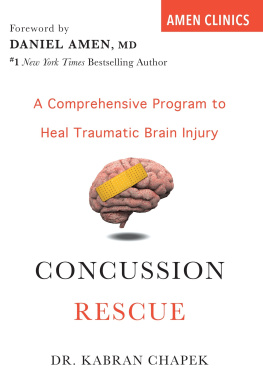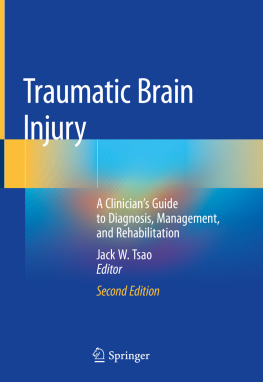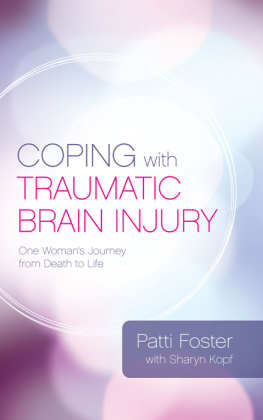Praise for Coping with Concussion and Mild Traumatic Brain Injury
Coping with Concussion and Mild Traumatic Brain Injury provides a thorough, detailed investigation into both the traditional medical and alternative hypotheses and treatments for concussive brain injury.
WILLIAM P. MEEHAN III, M.D.,
Director of Micheli Center for Sports Injury Prevention and Director of Sports Concussion Clinic at Boston Childrens Hospital
A virtual encyclopedia of concussion and its many treatments.
BOB CANTU, M.D.,
Clinical Professor of Neurosurgery and Codirector of the Center for the Study of Traumatic Encephalopathy at Boston University School of Medicine
Dr. Diane Roberts Stoler is an inspiration to all of us who are forced to confront concussions. This guide is an essential resource for all of those who refuse to give up and accept post-concussion symptoms. No treatment or rehabilitation works for everyone, and Dr. Stoler does a great job providing information on a wide range of options available or under investigation. She reminds us that there is always hope for a faster and more full recovery!
CHRIS NOWINSKI,
author of Head Games and cofounder of the Sports Legacy Institute
Praise for Coping with Mild Traumatic Brain Injury
Comprehensive
Coping with Mild Traumatic Brain Injury is one of the most comprehensive books on the subject of traumatic brain injury. With poignant personal insight, Dr. Stoler shares information on appropriate medicine, rehabilitation, and community services and support. Perhaps most importantly, the book provides guidance and inspiration for a new life after brain injury.
ALLAN I. BERGMAN,
President and CEO, Brain Injury Association
Remarkable
Diane Stoler has written a remarkable book. Her description of the neurologic, emotional, and psychological consequences of traumatic brain injury is encyclopedic, and will be instructive not only to survivors and their families, but also to every professional who works in this field. At the same time, something else emerges in this text, and that is the indomitable strength of the human spirit.
JOSEPH RATNER, M.D.,
Chief of Psychiatry, HealthSouth/New England Rehabilitation Hospital
Thorough and Practical
Coping with Mild Traumatic Brain Injury is a thorough, practical guide through unfamiliar and often frightening territory, offering wisdom and hope.
SALLY JESSY RAPHAEL,
Talk show host and mother of a person who sustained an mTBI
A Must
This book is a must-read for anyone who has experienced a mild brain injury, as well as for family members, friends, and professionals working in this area of treatment. In addition to providing valuable knowledge, it provides hope and inspiration for the future, from someone who has been there. It is the first book available for the many people who struggle with the unseen injury, providing for them a reference guide to follow during their treatment and recovery.
PAT LAZAREK,
Resource Coordinator, Massachusetts Brain Injury Association

Published by the Penguin Group
Penguin Group (USA) LLC
375 Hudson Street
New York, New York 10014
USA Canada UK Ireland Australia New Zealand India South Africa China
penguin.com
A Penguin Random House Company
Copyright 2013 by Diane Roberts Stoler Living Trust and Barbara Albers Hill
Illustrations by Jaclyn Caruso, used here with permission
by William Gonzalez
Penguin supports copyright. Copyright fuels creativity, encourages diverse voices, promotes free speech, and creates a vibrant culture. Thank you for buying an authorized edition of this book and for complying with copyright laws by not reproducing, scanning, or distributing any part of it in any form without permission. You are supporting writers and allowing Penguin to continue to publish books for every reader.
The excerpt is from From Inside Out by Beverley Bryant, which appeared in Through This Window: Views on Traumatic Brain Injury, edited by Patricia Felton, published by EBTS, Inc., 1992. Reprinted by permission.
by Rita Smithuysen is reprinted with permission from W. Barry Smithuysen.
Most Avery books are available at special quantity discounts for bulk purchase for sales promotions, premiums, fund-raising, and educational needs. Special books or book excerpts also can be created to fit specific needs. For details, write Penguin Group (USA) LLC, Special Markets, 375 Hudson Street, New York, NY 10014.
Library of Congress Cataloging-in-Publication Data
Stoler, Diane Roberts.
[Coping with mild traumatic brain injury]
Coping with concussion and mild traumatic brain injury : a guide to living with the challenges associated with post concussion syndrome and brain trauma / Diane Roberts Stoler, Ed.D., and Barbara Albers Hill.
p. cm.
Includes index.
ISBN 978-1-101-63161-4
1. Brain damage. 2. BrainWounds and injuriesComplications. 3. Brain damagePatientsRehabilitation. 4. Brain damagePsychological aspects. I. Hill, Barbara Albers. II. Title.
RC387.5.S75 2013 2013016860
617.4'81044dc23
Some names and identifying characteristics have been changed to protect the privacy of the individuals involved.
Neither the publisher nor the authors are engaged in rendering professional advice or services to the individual reader. The ideas, procedures, and suggestions contained in this book are not intended as a substitute for consulting with your physician. All matters regarding your health require medical supervision. Neither the authors nor the publisher shall be liable or responsible for any loss or damage allegedly arising from any information or suggestion in this book.
While the authors have made every effort to provide accurate telephone numbers, Internet addresses, and other contact information at the time of publication, neither the publisher nor the authors assume any responsibility for errors, or for changes that occur after publication. Further, the publisher does not have any control over and does not assume any responsibility for author or third-party websites or their content.
Version_3
To all people who have experienced a brain injury:
The human spirit is stronger than anything that can happen to it.
If there is a will, there is a way.
ACKNOWLEDGMENTS
B oth Coping with Mild Traumatic Brain Injury and this, our second book, are the result of countless hours of research, along with input from professionals who freely gave their time and commitment to the books success. Each chapter was reviewed several times by experts in the specific field for accuracy of information. With deep gratitude, I want to thank the following experts for their contributions in specific subject areas:

